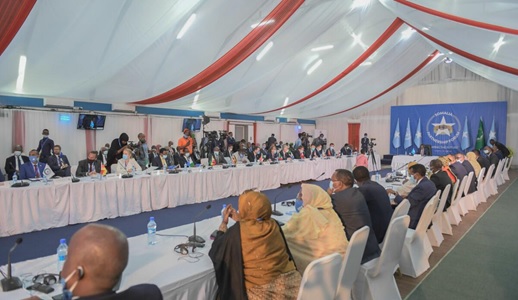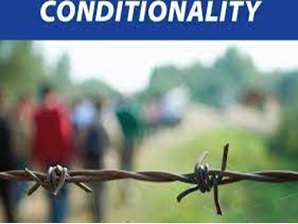By Jamal A. Mohammed
The fall of Somali government can be traced back to poorly managed democratic governance since 1969. The universal suffrage election model only happened in the 60s and subsequent attempts of state-rebuilding process favored transition governments and indirect elections based on clan sharing arrangements. The elections in the 60s coincided with a strict aid conditionality routine that existed in the traditional aid management system. However, the success of Somali elections in the 60s was not a direct result of the preconditions attached to aid but rather the Somali Youth League’s exceptional appetite for democracy. Hence, why the term ‘Africa’s First Democrats’’ was coined by Professor Abdi Ismail Samatar.

The election as a crucial pillar of democratic governance has faced enormous challenges hitherto. The state is generally unable to provide or unwillingly to deliver a credible election. At the same time, the donors faced significant challenges in supporting the election process in a context where there often are highly tense political developments characterized by conflicting interests between various actors at different levels.
The indirect election modality was reached on 17 September 2021. However, the implementation lacked serious political will and consequently this led to serious delays of the election process. Similarly, the unlawful attempt to extend the parliamentary and Presidential term limits further exacerbated tensions and created uncertainty in the country. Albeit the prevailing challenges and fragile politics – traditional donors such as the US, UK, Scandinavian nations continued to generously provide funding and other support. The donors have allocated close to 30 million USD dollars towards the elections. This figure does not include any additional fundings from by non-traditional donors – suffice to say the stark use of conditionality by non-traditional donors is counterproductive for democratization agendas in Somalia. This debate is out of scope of the analysis in this paper.
The international development partners have ostensibly abandoned their heavily criticized policies of structural adjustment policies (SAPs) and conditionalities in favor of a more lenient approach of partnership arrangements from 1990 onwards. Taking advantage of this shift – the two indirect elections in Somalia occurred at a time when donors have slightly relaxed conditionalities aimed at ensuring the implementation of political reforms in the recipient. However, upon a closer examination of the context in which the elections happened in 2022 – It is certainly believed that donors have strategically used conditionality to help exert immense pressure on the government and others alike. This was evident when representatives from the diplomatic community and other members of the international development partners constantly pressured leaders to compromise and implement the 17th September accord. On several occasions, representatives from donors communicated direct messages via twitter targeting peace spoilers in the election process, while others were individually placed under a strict travel ban list. A large amount of funding was also suspended – pending the delivery of a free and fair elections. In turn – this somehow triggered panic and a rushed decision to meet the election deadline.
‘’ Timely elections are a critical pillar of healthy democracy. Engineering a term extension is a breach of democratic norms & risks destabilizing Somalia. Stakeholders must reach consensus. Attempts to undermine dialogue on a path to credible polls MUST stop’’ Senate Foreign Relations Committee, USA.

The elections held on time can therefore be positively attributed to the donor’s strict use of conditionality. The analysis of conditionality in Somalia therefore defies any conventional thinking that attaching conditions to aid is a story of the past. In the same vein, the donor’s conditionality approach in Somalia challenges the work of Professors – Rita Abrahamsen[1] and Gordon Crawford[2]. Both scholars are highly critical of partnership and conditionality concepts and as such they view them as ‘’ubiquitous terms and ideation used by donors to control aid recipients’’. Such sentiments possibly could trigger an informative debate on the pros and cons of aid conditionality in a complex post-conflict reconstruction of Somalia.
The use of conditionality stems from the power donors possesses in Somalia and other post-conflict settings. The provisions of huge monetary support and technical know-how in turn gave the donors immense power to push for the election agenda. However, the outcome of the election was not satisfactory with claims of high levels of corruption related to vote buying and inadequate representations of the powerless groups such as IDPs, minority groups and women in the political process. This negatively infringes upon the human rights of the citizens and thus depicts a gloomy picture for building a modern democratic state in Somalia.
The direct use of power through conditionalities alone sometimes do not yield productive results, and perhaps this could be lessons learnt and opportunities for donors to invest more in civic education programmes in the future. This Foucauldian type of power is part of the philosophical contribution of Michel Foucault in his research on how ‘disciplinary power’ change the behavior and attitude of the citizens at the height of the French Revolution period.
Jamal.A.Mohammed
Email: [email protected]
————
Jamal is an independent consultant and Doctoral Candidate at Politics & International Studies Department, The University of Warwick, United Kingdom.
Reference
- Abrahamsen, R (2004) The Power of Partnership in Global Governance, Third World Quarterly, Vol, 25, No. 8, Taylor and Francis Publishers
- Crawford, G (2003) Partnership or Power? Deconstructing the ‘partnership for governance reform in Indonesia, Third World Quarterly, Taylor & Francis Publishers
- Samatar, Abdi Ismail and Samatar, Ahmed I. (2008) “Somalis as Africa’s First Democrats: Premier Abdirazak H. Hussein and President Aden A. Osman,” Bildhaan: An International Journal of Somali Studies: Vol. 2 , Article 4. Available at: https://digitalcommons.macalester.edu/bildhaan/vol2/iss1/4
- Hoofman, M( 2014) Disciplinary Power – Michel Foucault , Routledge Publishers
We welcome the submission of all articles for possible publication on WardheerNews.com. WardheerNews will only consider articles sent exclusively. Please email your article today . Opinions expressed in this article are those of the author and do not necessarily reflect the views of WardheerNews.
WardheerNew’s tolerance platform is engaging with diversity of opinion, political ideology and self-expression. Tolerance is a necessary ingredient for creativity and civility.Tolerance fuels tenacity and audacity.
WardheerNews waxay tixgelin gaara siinaysaa maqaaladaha sida gaarka ah loogu soo diro ee aan lagu daabicin goobo kale. Maqaalkani wuxuu ka turjumayaa aragtida Qoraaga loomana fasiran karo tan WardheerNews.
Copyright © 2024 WardheerNews, All rights reserved


